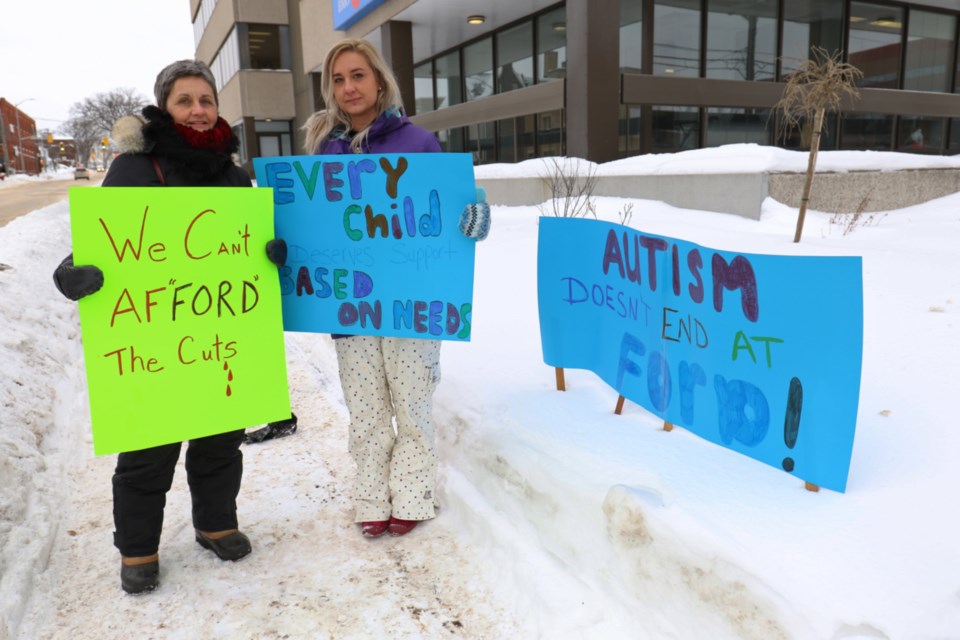Ontario Autism Coalition regional coordinator Morgan Fiaschetti is standing outside of Sault Ste. Marie MPP Ross Romano’s office Thursday morning, clutching a picket sign.
Like many of the people gathered at the corner of Bay and Elgin, she's wondering how she'll scrape together the money to afford ongoing autism treatment for her son.
“This is unacceptable,” said Fiaschetti. “Not only am I fighting for my children, I’m fighting for others and their children.”
Fiaschetti’s 11 year-old son, Maxxim, lives with severe autism.
She was hoping for financial help through Ontario’s autism program, but under the government’s new funding model for that program, Fiaschetti says those hopes have been dashed.
“As much as this new program will get my son off the waitlist, the service that will be provided is very inadequate,” Fiaschetti said. “So due to my son’s behaviour, I was hoping for a 30 to 40 hour per week program that would deliver significant changes and help for him.”
“Unfortunately with the new system, I will only receive one to two hours a month with the new funding.”
Under the new autism funding model, children would qualify for up to $20,000 per year from ages two to six.
Once a child turns six, families would qualify for up to $5,000 annually until the child turns 18 years old.
Many protestors outside Romano’s office told SooToday that a ‘one size fits all’ approach to autism funding isn’t going to work.
“They’re literally spending the same amount on every child, and because autism is a spectrum, some children require more intense therapy, and some require less intense,” Fiaschetti said. “What they’re doing is putting us all into a basket and saying, ‘well, here’s what you’re getting.’”
Fiaschetti says that intensive behavioural intervention (IBI), which costs anywhere from $60,000 to $80,000 per year, won’t be covered for her son under the new funding model.
This comes after finally getting approved to get into the province’s autism program - after waiting for more than four years on the waiting list.
Now, even if her son qualifies for the $5,000 a year in autism funding, Fiaschetti says she won’t be able to afford his IBI treatment.
“A huge chunk of that’s just going to go to assessments and clinical aspects instead of actual therapy,” she said. “My son needs more than that.”
Representatives from the Sault Ste. Marie and District Labour Council, Ontario Secondary School Teachers’ Federation and the Algoma Elementary Teachers’ Federation of Ontario (ETFO) were also on hand to lend support to Thursday’s protest.
Lee Mason, president for the local ETFO chapter, says that ongoing cuts by the Ontario government will be detrimental to classrooms.
“We’re expecting some serious cuts and changes that will limit staffing and the number of people who can get resources,” Mason said.
Many of the protestors told SooToday that children living with autism need routine and consistency - whether at home or in the classroom.
The new autism funding model, Mason says, won’t provide children with the routine and consistency they need, which will eventually spill into the education system.
“The strain and stress on teachers, on EAs [educational assistants], on the parents at home even - because the kids come home without that consistency, especially with autism,” Mason said. “We need that regime - that daily pattern - and when that gets broken, it’s hard.”
The Ontario Autism Coalition is now circulating a New Democratic Party petition calling for “true investment in evidence-based autism services that meets the needs of autistic children and their families.”
In the meantime, Fiaschetti says that she’ll keep protesting regularly outside Romano’s office.
“I’ll be here every week if I have to be, just so that I can see change, and making sure that those kids are taken care of - that’s all we want.”
In a presentation delivered in 2017 to then-PC candidate Romano and then-PC leader Patrick Brown, the Algoma Autism Foundation reported that one in 34 children have autism in the Algoma District, while the provincial average is one in 68 children.
“These statistics are shocking and these children and families have gone for so long without a voice to fight for them,” said Romano in a 2017 news release.
Romano was unavailable for comment.
